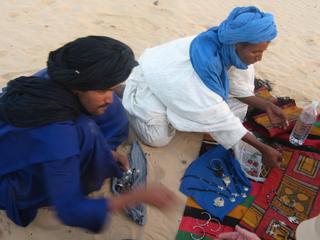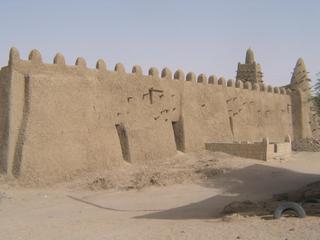Timbuktu


Woke late having slept through my alarm and feeling creepy abut the Rosaire situation, which I wanted to both avoid and forget. I decided to go get an omelet while they were going to the bank, but because Mopti’s so small, they passed me on the way back and in the confusion, I turned down their offer to come along. Instead, I walked with some local 25-year-old guide who was an incredible ego boost. While walking to breakfast he told me I had beautiful hair and a nice body. I dragged out my fictional husband, but that didn’t seem to concern him. He went on about how my body was doing things to his body and I should give him part of my body. Then he went on about how my husband might make me happy, but he could make me happier “in those ways.” It was good for a laugh.
We ended up leaving a half hour late because X–or and Moktar decided to go hunting for me. Heaven forbid I should manage to do anything on my own. Sometimes I really appreciate the helpfulness of Africans and other times I think it’s a real pain in the ass.
The journey proved rather boring, as there’s little to look at except grass, scrub, thorny trees, skinny cows with long horns, skittish sheep and the occasional herder wrapped in loose fabric and sporting a turban wrapped around his head. The donkeys were the only ones to force us off the road.
Lunch was somewhat depressing, as we ate at a roadside restaurant where hungry children huddled around looking for scraps of food, cadeaux, our empty water bottles, anything. They were raggedy like the children in Koro and awfully hungry. When the proprietor put out a pan of white rice, 10 hands dug in greedily. Moktar gave them the scraps of his lunch, poured eagerly into the tomato tins they wear around their necks and Gilles nearly lost his arm when he put out a plate of unfinished mango. He thought about offering the last of the candies, but decided against it when he compared the number of candies to the number of kids. A war could have broken out over lollipops.
As soon as lunch was over we hit the piste, the washboard road that makes “quat-quats” the transport of choice and one bumpy enough that by the end I was wishing for a sports bra. The scenery didn’t change dramatically, although we were able to see the northern part of the falaise, which has rather dramatic rock formations. A couple camels appeared sporadically, bound at the front legs and munch on the leafier trees.
Only a few kilometers in, the air conditioning quit, which was vexing to everyone but Gilles and myself, who sat in the car while the others pounded on various things with a rock. It got going again, but only after a little break. There is literally only one village between Douentza and Timbuktu and the signposts count it down every 10-km. The road conditions drop off dramatically after the sole village, becoming the kind of rolling, quick drops that make you lose your stomach. The driver appeared to get more maniacal the worse the road got, sliding around in the sand and skidding across loose gravel. Timbuktu, it got confusing, as the road simply ends at the Niger’s banks, which moved depending whether it’s the rainy or dry season. So our driver merely made his own course, weaving through cows and donkeys to come to a tiny blue ferry with just enough room for three 4x4s. It was just our luck that a USAID truck pulled up just ahead of us and we were able to get across without any wait. Our driver got out immediately to do his prayers and it wasn’t long before we were on the other shore, driving up to the paved road into Timbuktu.
The town is so legendary, I really didn’t know what to expect. Maybe streets of gold, or lavish homes or something to speak of its glorious past and its reputation as a huge trading post and a centre for Islamic study. The road in is lined with the offices of aid organizations, children’s charities and anti-hunger programs. And once past the “city gates” of sandcrete, it’s just a collection of muddy brown buildings some so dry they’re cracked, others crumbling under too many rainy seasons without repair. I asked Moktar about nightlife in Timbuktu and he said there’s one nightclub. So what is it about the town that makes it such a destination, aside from the bragging rights that come with having visited?
We checked into our hotel and headed out into the dusty night for some dinner. Moktar talked a little about religion and second wives and large families – Rosaire has 15 siblings – but we were all feeling pretty tired, so we walked home for bed. Along the way, I befriended Mohammed, a skinny little bald-headed kid with a megawatt smile and a good grasp of English. He told me he was heading into the desert around the same time as us to head with his father’s caravan aback to his village for his elder sister’s marriage to a Tuareg from Morocco. The village was only 45 km, so it would only be a full day’s ride, but he said the salt caravan, which he sometimes accompanies, goes for 18 days there and 18 days back. He told me isn’t in school, but maybe after the wedding his father would let him go for two or three months because he wants to be a doctor, a Doctor of the Desert. Who knows if it was a load of hooey. I found him engaging and charming and gave him a little Canada pen.
I went to bed around 10 p.m. and slept so soundly I woke briefly in the early morning hours and realized I hadn’t changed sleeping positions at all. I wrapped the furry blanket around me and fell dead asleep until 7 a.m., but still woke feeling pretty tired. Rosaire took me aside to apologize for what he had said, or proposed, and I just brushed it off, but man, how weird.
We marched over tot he mosque with a local guide and heard that it was the largest, most important mosque in the Maghreb for years, but each emperor left his mark. I have to admit, it’s not as awe-inspiring as the Djenne mosque, which rises rather majestically, but apparently it holds more people. (The “women’s quarters” were a mere two rows and the guide told us that there aren’t many women who come to pray, as they’re more concerned with cooking and raising children. The schools, he said, are mostly boys, as the girls get all the education they need at home, learning how to take care of the men. Bleech, I say.)
We walked a bit around town and over to the museum (a rather uninspiring collection of black and white photos and dusty examples of Timbuktu products like herbs and seagrass baskets. Then we saw the explorers homes and another mosque. All pretty boring stuff, really, marred further by the ubiquitous vendors who would reach into the billowing folds of their bobos and pull out earrings, necklaces, letter openers, all “made by my own hands” and selling at a “petit prix.” By lunch I was pretty tired of it all, frankly. A lot of African cities are the same, with their dusty streets, begging children, annoying vendors or Rastas, flyblown markets and Artists’ stalls. Timbuktu was absolutely no different as far as I could tell.
We had lunch at another stall with yummy peanut sauce and then headed to the hotel for the usual repose. I have to admit, I was probably in shape for a nap – the men were treating me with kid gloves – but I preferred to go to the tourist office for a stamp and an interview.

0 Comments:
Post a Comment
<< Home